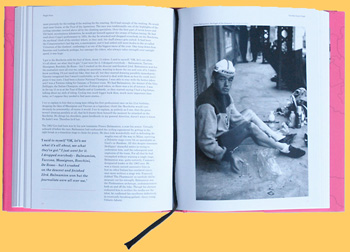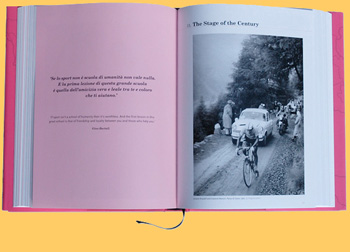
..........................................................................................................................................................................................................
herbie sykes interview

what possessed you to undertake such a mammoth work as 'the maglia rosa'?
It seemed the natural thing for me to do after the Balmamion book. I needed to write another book, and it's the thing that most interests me. Or, more accurately, the thing that consumes me...
is a work such as this a leap of faith, or do you check the likelihood of publication before embarking upon paragraph number one?
Interesting question Brian. I'd an idea I would get it published somewhere, though not neccesarily through the traditional channels. Adrian Bell at Mousehold was kind enough to publish the Balmamion book, and obviously the subject matter there was pretty obscure. Given that this ought to have a better chance commercially, my feeling was that somebody would take it.
At the outset I spoke with two major publishing houses and a couple of agents. All were complimentary about the work, but said they didn't know how to sell a book about the Giro. I don't have an agent, and I hate all that fluffy business stuff, can't be bothered with it.
Rouleur contacted me off the back of the last book, and over the last couple of years I've become a regular contributor. I was delighted when they said they wanted it, and I think it's a really good fit. They're all about quality, and they understand bike racing. Better still they understand the way I write.
what was plan 'b'?
There wasn't one.
as a writer, do you find yourself looking at situations in cycling from a different perspective, always wondering whether there might be a story waiting to be written?
No, not really. My starting position is that I'm a fan. I love the sport and I care about its wellbeing.
how do you go about researching something as deep and meaningful as the history of the giro d'italia?

You read and read, and then you read some more. You talk to as many people as possible, and you try to understand if what you've read is accurate, or simply expedient. With a book like this it was also important to gauge the material effect that any given set of circumstances had on the race as an organism. You also have a responsibility to be honest, and to look beyond the myths that cycling disseminates. The sport was invented to sell newsprint, and you've to be mindful of that at all times. Pantani is a case in point. They've almost sanctified him here, but the fact is that, ultimately, he did a huge amount of damage to the Giro d'Italia.
how much didn't you know before you started?
I would say I was always fascinated by it, but that a lot of what I thought I knew was untrue, over-simplified or hugely exaggerated. There is so much to know that you're never going to get remotely close to knowing even the half of it. I've written a history of the Giro d'Italia in 100,000 words, but with a work like this you're only ever going to scratch the surface. As such what's in there is in fact a tiny, tiny fraction of what there is to know. I could write five more books about it, and still not get close. The best you can hope for is to entertain people, and to give them a feel of the way it's been.
to my mind, like a good joni mitchell album, maglia rosa will bear reading more than just once to properly appreciate (similarly in fact to 'the eagle of the canavese'). is that a conscious consideration when writing?
Not really. I simply try to be as honest as I can, and I'm very conscious of the fact that every word counts a great deal. I'm a workaholic.
were you aiming to inform or educate or both?
I would say both. I probably don't have that much new to say about Coppi, because it's done to death. By definition you've a very limited amount of space, and so my inclination is always to try to tell people something they didn't know beforehand. That's why you'll find more in the book about, say, Orfeo Ponzin, than about Fausto.
was it easy to find and interview the likes of tino coletto and italo zilioli? were both keen to tell their stories?
The reason I chose those two was neither of them are predisposed to talk, and as such both have been misrepresented over the years. In general, though, people are pretty accommodating, I think in part because I'm English and they're intrigued that I might be interested. What you learn from spending time with them is that they all have fascinating stories, even if they don't always appreciate the fact themselves. For me somebody like Zilioli is infinitely more interesting on a human level even than Gimondi. The great joy of the work is in the finding out. Thereafter you just pray that the way you write it does them justice.
was the zilioli chapter a deliberate attempt to create intrigue and mystery (if so, it worked:-)
I would say that the mechanism I used for him is derivative of his character. It wasn't a 'deliberate attempt' as such, but as a metaphor it seems to work pretty well. Or at least I hope so...
did you ever consider approaching the story of the giro in cryptic fashion, as in the style of your castellania article accompanying ben ingham's photos in this year's rouleur photo annual?

No, not really. It's about fit for purpose. The Castellania thing was just an attempt to evoke something of Coppi's childhood in 700 words. I could never pull something like that off in this context.
have there been any substantial histories of the giro published in italian?
Dozens. Good, bad and indifferent.
in which case, was the option to translate into english rather than write your own ever a consideration?
I find translating miserable and soul-destroying. There are very few books that I'd want to translate, and I guess the reason nobody's done it is because there's little or no market.
do you think that the modern incarnation of the race remains true to its considerable heritage, or is it in danger of becoming a marketing fest like the tour de france?
I think on balance it's doing OK now. When Zomegnan took over in 2006 he wanted to put his mark on the thing, and he's made some shocking blunders over the years. I think 2009 was a tipping point for him. It was disastrous on almost every level, and I think he was really chastened by it. The last thing the Giro needs is to be re-invented, and I think the penny has dropped now.
There's a very complicated balance to be struck as regards the route, and it's contingent on so many factors that the public isn't neccessarily aware of. The Giro has to make money for RCS, and so that conditions the thing to a large degree. As regards the heriatge it's a very difficult one. The reality is that cycling is deeply rooted here, but that these days it's a much smaller sport than people seem to believe. It therefore needs to reach out to people if it's to survive, but I think that on balance they've figured out that what they're selling is Italy. For me it's still a joy to be at the Giro, be it on the roadside, or in the machinery of it. God help us if it becomes even remotely like the Tour.
you were critical of the giro route a couple of years ago when you accused the organisers of pandering to lance armstrong. has your confidence been restored since then?
2010 was great, because the route made for great racing (and the weather was a huge bonus). 2011 looks about right to me. I sat and listened to a very famous Australian cyclist bemoaning the fact that they had to ride a 256km stage last year, couldn't believe what I was hearing. For me the harder the better, because that's the way heroes are made, and cycling desperately needs them right now. These lot don't know they're born...
how much material arrived co-incidentally while researching many of your articles for rouleur, bicycling australia and procycling? does persistence pay dividends?
Separate issues really. The Procycling stuff is relatively recent, and most of the book was already researched when I started doing it. Rouleur's attitude is that I work best on the stuff that interests me. Occasionally I'll get sent to do something by them, but they understand that I need to passionate about the subject matter. The Ian Steel piece would be an example of that. It was something I was desperate to do, and as such I invested a huge amount of time and energy in it. I'd say it's amongst the best work I've done, and there's no no coincidence there. The Australians are great; they just let me get on with it.
I'm on with a story at the moment which is really important to me, and I think really important for the history of the sport. I have to know absolutely everything I can about it, because to my (utterly deluded) mind it's the most important thing which will be written this year about bike racing. I'm like a dog with a bone with it because if I miss anything I'll feel like I'm failing the people involved.
Because a lot of it is pretty obscure I almost feel an added responsibility to make it half-decent. I'm asking people to publish stuff that's not, metaphorically speaking, Alberto Contador, that's not news in the traditional sense. It's not always an easy sell, so it should at least be the best I can make it.

is italy as a country still as obsessed with its grand tour as it always was, or has this been diluted by other sports?
Cycling is some distance behind football, Formula 1, and Valentino Rossi. I'd say it's about equal with basketball here. It desperately needs another Moser / Saronni spat, but the way the sport has evolved makes that highly unlikely.
has it become an institution immune from the naysayers and encroachment of an italian world that is maybe more aware of its place in the world? or has each year meant a struggle to survive?
I wouldn't say that the sport of cycling is immune, though the Giro transcends that to a significant degree. I think cycling here in general needs some political help. It needs, and has always needed, people to be riding bikes. That way more people readily identify with what cyclists do, and that's precisely why Australia (for example) is producing so many riders now. Italians are really into cars, and there isn't the political will to get people on their bikes, more's the pity. They should do what the Danes do, and throttle car usage with tax; In Copenhagen there are bike traffic jams...
how much is the giro dependent on other italian classics such as milan sanremo and the tour of lombardy?
I'd turn that question on its head. They need the Giro much more than it needs them. Italians know exactly when that the Giro will happen, and so it's part of the fabric of the early summer. Sanremo is a pretty ordinary spectacle these days, and the crowds on the Poggio seem to diminish every year; it needs a massive overhaul because you know precisely what's going to happen. It's 20 years since the last great escape, and that's really unhealthy. Lombardy, on the other hand, seems to be doing well for itself, simply because the route itself means you're guaranteed a great race.
What's interesting is that the wellbeing of the races is largely dependent on the relationships with local politics. The Giro di Trentino is on TV every year, and as such it gets sponsors and does OK. It does OK because the politicians throw money at it as a mechanism to promote the area. Others, the tours of Tuscany and the Apennines for example, have drifted into obscurity, because they have no political clout, or have nothing to sell. Those two were massive races back in the day, and it's a tragedy that the Apennines is being run on the same day as Roubaix this year. The Pro Tour (or whatever they call it these days) has had a catastrophic effect on a lot of those races, and my guess is that they'll disappear altogether pretty soon, as have the Tour of Lazio and Milan - Turin.
can the cycle race be separated from italian social and political history, or are they so intertwined as to make that a stupid question?
It doesn't, and never did, exist in a vacuum. Obviously, though, it's far less significant a sport than it was, and in general people are much less politicised than ever before. Italy declared war the day after the 1940 edition, no mere accident of timing.
there's a conversational aspect to your writing, one that comes as a very pleasant surprise in a volume of this magnitude. is that a conscious strategy, or is it 'simply' a comfortable style to inhabit?
I don't know about that. I wouldn't say it's a comfortable style to inhabit, because as a writer I'm not so very conscious from a stylistic perspective. I have no training and no education, and nobody ever taught me to write. Therefore I guess it's not particularly scientific. I suppose if I analyse it, it's contingent on all sorts of things (mood, subject matter, the need for the thing to roll along) but if I'm honest it's pretty organic; it pretty much just comes out!
do you find that writing in this way, on specific subject matter, helps you to understand and consolidate italian cycling history in much the same way as i figure you'd hope your readership will?
I don't profess to understand Italian cycling history in its entirety, but I enjoy finding out. I know a bit about its significance at any given time, and I hope that this book will be informative in that respect. What's interesting is that cycling was a massive sport here before the war, and yet somehow most people don't get beyond the years 1946 - 1955 when examining it. The Coppi and Bartali years were obviously informed by what Bartali did before the war, and by the Guerra/Binda years. Guerra in particular was a huge figure in Italy in the 1930s, a working class hero to millions.

is it the cycling you're in love with or the writing? for instance, could you see yourself writing comfortably about a subject other than bicycles?
I'd say I love cycling, and that very occasionally I love writing. It's like riding in the sense that for the most part you're just chiselling it out, and yet from time to time it's the easiest, most natural thing in the world. People tell me I ought to write about something else, and deep down I know they're right. Problem is that cycling is what most matters to me, and I feel lucky to be able to do it for it for a living (of sorts).
i'd have thought that a book about the giro would have been close to the pinnacle of a cycling writer's career. but given that you're ar too young for that, is this a book you'd hoped would have come to you later in life?
No. As I said before I needed to do another one, and it's the thing I was best qualified to do.
in which case, where does herbie sykes go from here?
Don't know. When you start out you have this huge, terrifying mountain in front of you, and you've somehow got to get over it, or at least around it. I'd like to do another biography, possibly of Brunero, maybe Nencini, conceivably Magni. The other one is a book about those guys who, for whatever reason, didn't make it; the really talented ones we've never heard of. Problem is that none of the above really put Anglo-Saxon bums on seats. I have to put food on the table, so there's a balance to be struck.
I have to write stuff I care about, and so that conditions it to a large degree. By the same token you've got to get published, and you want people to be exposed to your work. The Balmamion book taught me that the subject matter is everything, or least nine tenths of everything. I had an idea I'd written a decent book, and so I assumed tnat people would buy it. The reality, though, is that books are made to be sold, and if people subsequently read them then all well and good. Most people I speak to say they liked it, but those people are like me, they're hard-core cycling fans. This is precisely why there so many books about the TDF every year. People buy them...
I quite like football and there's a particular match I'd like to do, but it would involve a huge amount of reserach and lot of travelling. There's also a degree of risk involved because I'd be well outside my comfort zone, and because ostensibly something like that ought to be successful commercially. With cycling I can delude myself that people don't read my books because of the subject matter, whereas if a book of that sort failed (on any level) I'd only have myself to blame.
Cycling it is then...
maglia rosa by herbie sykes is currently available from rouleur books priced at £29
posted saturday 5 march 2011
 ..........................................................................................................................................................................................................
..........................................................................................................................................................................................................